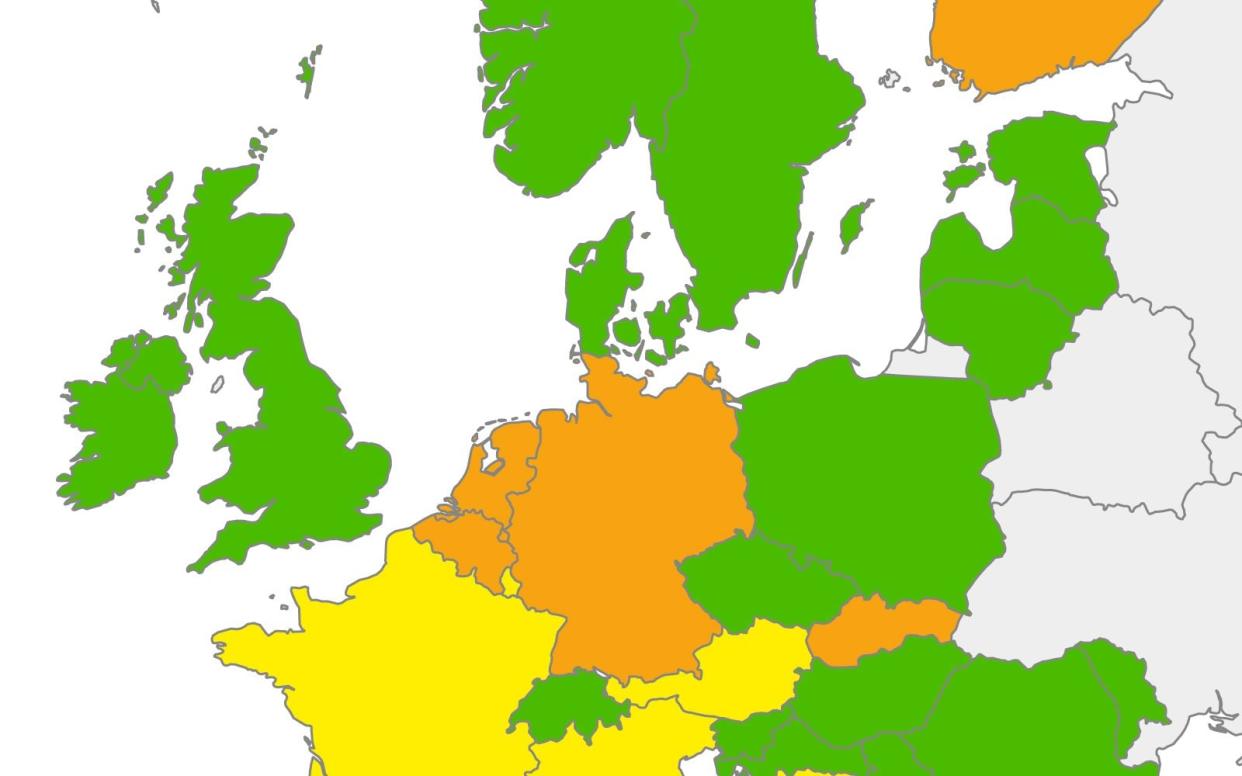The travel restriction map of Europe is becoming a calming sea of green

Perhaps we have Norway to thank. The Nordic country’s groundbreaking decision to scrap all entry requirements on February 12, returning travel to its pre-pandemic normal, triggered something of a domino effect. Iceland followed suit on February 25, Britain on March 18, and Denmark on March 30.
Now, what began as a trickle has become a deluge. The era of Covid travel restrictions – in Europe, at least – is becoming a thing of the past, with the restriction map of the continent rapidly transforming from a hectic matrix of red, orange and yellow into a beautiful and calming sea of green.
The summer holiday favourites of Croatia and Greece were among the latest to join the club, with May 1 marking the date for a return to holidays devoid of red tape (your standard passport excluded). Switzerland signed up for travel normality on May 2, making summer hiking holidays in the Alps just that little bit more enticing. Serbia, North Macedonia, Bulgaria and Albania represent four more recently minted members of the green team.
It all means that, as of May 4, an impressive 25 countries within Europe have scrapped every last travel restriction. No testing, no forms – regardless of vaccine status.
The 25 European nations with no travel restrictions
Albania
Bulgaria
Croatia
Czech Republic
Denmark
Estonia
Greece
Hungary
Iceland
Ireland
Kosovo
Latvia
Liechtenstein
Lithuania
Moldova
Montenegro
North Macedonia
Norway
Poland
Romania
Serbia
Slovenia
Sweden
Switzerland
United Kingdom
The above list vindicates the experts Telegraph Travel spoke to back in January. “Many countries will follow the UK and abandon travel rules in the coming weeks as they learn to live with Covid. For once the industry has much to be positive about,” said Paul Charles, CEO of travel consultancy The PC Agency, at the time.
Prof. Francois Balloux, director of the UCL Genetics Institute, said “more liberal governments like Sweden and Switzerland” would be among the first to “turn the page”, adding: “In some southern European countries, such as Italy and Spain, I think they have been so traumatised over the last two years that it might take longer to get back to normal. Also, the Covid debate is not as open in these countries; there has been little but blanket support for extreme restrictions, particularly in the media.”
David Livermore, Professor of Medical Microbiology at UEA, predicted: “Europe will be patchy, not least because of how far some countries have gone – however pointlessly – down the path of internal vaccine mandates and passports. Scandinavia and Eastern Europe, plus Portugal, will open early, but France, Italy and Austria will be late.”
With very few exceptions, all have been proven correct.
Beyond Europe, a few countries have scrapped every travel barrier, including Mexico, El Salvador, Costa Rica, Cuba and the Maldives, but the rest of the world is largely playing catch-up.
Which European countries still have travel rules?
Unvaccinated arrivals banned:
Belgium
Finland
Germany
Netherlands
Slovakia (although entry is permitted via neighbouring countries)
Spain
Surprisingly – given its reliance on overseas visitors – Spain remains one of the strictest countries in terms of entry requirements, with all unvaccinated or (if their second dose was more than 270 days ago) unboosted adults banned. This cohort is certainly not insignificant, and likely includes more than 10 million Britons. Last month it seemed as if this rule had been lifted, when the Spanish Tourist Office issued a press release stating that proof of a negative test would be accepted in lieu of vaccination, but this was rescinded just hours later.
Tests for unvaccinated arrivals:
Austria
Bosnia and Herzegovina
Cyprus
France
Italy
Luxembourg
Malta
Portugal
Turkey
No country in Europe asks vaccinated travellers to take a Covid test. However, several demand proof of a recent negative test from unjabbed visitors including holiday favourites France, Italy, Portugal and Turkey.
As for the rest of the world, restrictions remain the rule, rather than the exception. Indeed, 10 countries – China, Japan, Taiwan, Myanmar, Marshall Islands, Micronesia, Samoa (until August or September), Solomon Islands, Tonga and Vanuatu – are still closed to all tourists, regardless of vaccination status.
Elsewhere, testing is widespread, whether for unvaccinated arrivals (eg Dubai, Egypt, India, Tunisia, Dominican Republic, Peru, Brazil) or for all (eg Australia, New Zealand, Morocco, US, South Africa, Tanzania, Vietnam). Furthermore, a large number (eg Australia, New Zealand, Morocco, US, Canada) ban unjabbed visitors entirely.
The mask is slipping
If testing for unvaccinated arrivals is the last bastion of border rules, then domestically it seems the face mask will be the final relic of Covid times. Yet, after two years of hidden faces and muffled conversations, rules around face coverings are also being discarded across Europe.
No masks whatsoever*
Bulgaria
Croatia
Czech Republic
Denmark
Estonia
Finland
Hungary
Iceland
Ireland
Netherlands
Norway
Poland
Romania
Slovenia
Sweden
What is it about the Nordic nations? All have been reticent to restrict their citizens’ freedoms for the duration of the pandemic – with Sweden famously eschewing lockdowns altogether and its neighbours only shutting down society for a brief period – and all five have now scrapped masks.
Beyond Europe, only a handful of destinations have ditched the divisive garment, including Aruba, Dominican Republic, Jamaica, Maldives and the US.
*With the possible exception of hospitals and care homes.
Masks only on public transport**
Beyond healthcare facilities, it seems that trains, planes and buses will be the final settings where masks still roam. France and Spain are among the countries retaining their use on public transport.
Belgium
France
Latvia
Lithuania
Montenegro
Portugal
Spain
Switzerland
**As well as hospitals and care homes.


